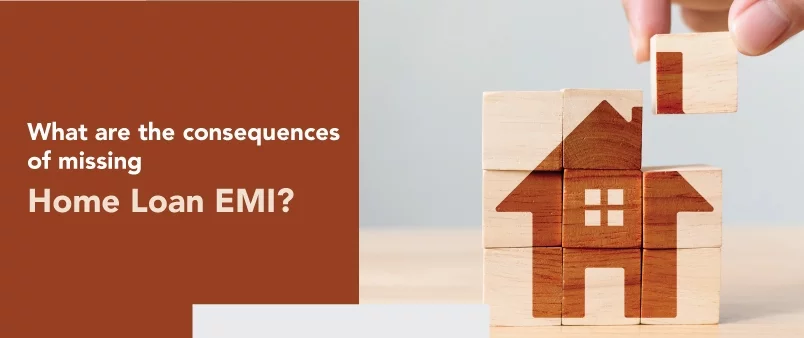What are the Consequences of Missing A Home Loan EMI?

Meeting your Home Loan Equated Monthly Installment (EMI) is vital to maintaining financial stability. However, life’s uncertainties can sometimes lead to missed payments.
In this comprehensive guide, we explore the repercussions of missing a Home Loan EMI, shedding light on the potential impact on your financial well-being.
Understanding the consequences is crucial for borrowers to navigate their housing loan responsibly and mitigate avoidable challenges, especially considering the current housing loan interest rates.
Consequences of Missing a Home Loan EMI:
-
Impact on Credit Score:
Missing Home Loan EMI payments significantly harms your credit score, a numerical representation of your creditworthiness. A lower credit score diminishes your ability to secure credit in the future, impacting various aspects of your financial life, such as obtaining credit cards, personal loans, or even affecting potential employment opportunities.
-
Accrual of Late Payment Fees:
Lenders penalize late payments with fees, intensifying financial strain. The cumulative effect of these late payment fees over time exacerbates the overall financial burden, making it imperative to prioritize timely EMI payments to avoid unnecessary additional costs.
-
Accumulation of Interest on Outstanding Amount:
Unpaid EMIs result in the accumulation of interest on the outstanding amount. This interest accrual not only amplifies the total repayment burden but also affects the overall cost of the loan, making it more expensive in the long run.
-
Risk of Loan Default:
Repeatedly missing EMI payments elevates the risk of loan default. A default not only tarnishes your credit history but also exposes you to legal consequences and the possibility of foreclosure, putting your homeownership at substantial risk.
-
Limited Access to Future Credit:
A compromised credit history resulting from missed EMI payments restricts your access to future credit facilities. Financial institutions are hesitant to extend credit to individuals with a history of payment defaults, limiting your financial flexibility and options.
-
Strained Relationship with Lender:
Continuous defaults strain your relationship with the lender. A strained relationship can lead to difficulties in negotiating favorable terms for future financial transactions, potentially affecting your ability to secure better interest rates or terms on subsequent loans.
-
Legal Consequences:
Persistent non-payment can escalate to legal actions. Lenders may issue notices, and in severe cases, initiate foreclosure proceedings.
Legal consequences not only amplify financial distress but also bring about significant legal challenges, further complicating the borrower’s financial situation.
Housing Loan Interest Rate and Its Implications:
-
Impact on Interest Accrual:
When EMI payments are missed on a housing loan, the repercussions extend to the interest accrual. The missed payments disrupt the regular repayment schedule, leading to higher interest calculations.
This, in turn, can potentially escalate the total interest paid over the entire loan tenure. It’s crucial to comprehend that the impact is not only immediate but resonates throughout the loan duration, making timely payments pivotal in minimizing the overall financial burden.
-
Negotiation Challenges for Future Rates:
A compromised payment history, marked by missed EMI payments, poses challenges in negotiating favorable housing loan interest rate in the future.
Lenders scrutinize your payment track record when determining interest rates for subsequent loans, potentially resulting in less favorable terms due to the perceived risk associated with a history of payment defaults.
-
Long-Term Financial Consequences:
The ramifications of missed payments on a housing loan are not fleeting; they cast a long shadow on your financial stability.
Higher interest rates, stemming from missed EMI payments, lead to long-term financial consequences.
This increased financial burden affects overall affordability, potentially impacting your financial goals and creating lasting challenges in managing your budget effectively.
The importance of maintaining a consistent payment history cannot be overstated for securing favorable housing loan interest rates and sustaining long-term financial well-being.
Conclusion
The significance of meeting Home Loan EMI cannot be overstated in maintaining financial stability. Life’s uncertainties may lead to missed payments, triggering a cascade of detrimental consequences.
From a diminished credit score to legal actions and strained relationships with lenders, the repercussions are extensive.
The guide underscores the importance of understanding these consequences, especially amidst current housing loan interest rates.
Timely payments are not just immediate financial responsibility but a safeguard against enduring challenges, including escalated interest accrual and negotiation difficulties for future rates.
Recognizing the long-term financial implications emphasizes the critical role a consistent payment history plays in securing favorable housing loan terms and ensuring sustained financial well-being.











